|
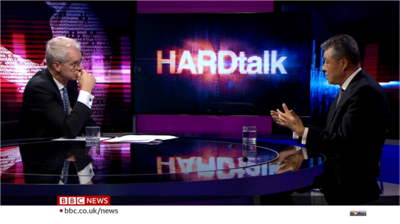
On November 26, H.E. Ambassador Liu Xiaoming gave an exclusive interview on BBC’s HARDtalk hosted by Stephen Sackur to explain China’s position on Hong Kong, Xinjiang and China’s peaceful development. The full transcript is as follows.
Sackur: Ambassador Liu Xiaoming, welcome to HARDtalk.
Ambassador: Thank you for having me.
Sackur: It’s a pleasure to have you here. Let us start with Hong Kong. President Xi Jinping has been in power for 7 years. Would you accept that the prolonged unrest and instability in Hong Kong is the greatest challenge he has faced in his presidency?
Ambassador: I think our government’s policy is clear. Twelve days ago, President Xi made a very authoritative statement when he attended the BRICS summit. He said the top priority for Hong Kong is to end violence and restore order.
Sackur: With respect, he’s been saying that for months. The violence began in early summer and violence continues. Not just the violence. We also have the massive political expression represented by the results of last Sunday’s Council elections. The people of Hong Kong have squarely, by an overwhelming majority, expressed their grave dissatisfaction with the Hong Kong and Beijing authorities.
Ambassador: First thing first. I think you have to separate the peaceful demonstrators from the violent rioters. You mentioned the latest Council elections. That exactly shows that President Xi’s message, loud and clear, has been well received, that you can only exercise the right for democracy in a peaceful environment.
Sackur: If I may just continue with the story about what the Council elections tell us. They had a choice. They had a lot of pro-Beijing candidates. They had a lot of candidates expressing views of the opposition and the protestors, pro-democracy protesters, on the streets. And the overwhelming majority, almost 400 out of the 452 seats, went to those opposition figures. The figures are actually extraordinary, 70% of turnout, 17 of 18 Councils now controlled by the pro-democracy political movement.
Ambassador: I don’t think you should have an over interpretation of the so-called landslide victory of the opposition. Though it’s 17 out of 18 Councils, in terms of votes, it’s 40% versus 60%. So 40% of the voters voted against the opposition. Secondly, like in any country, even in Western culture, incumbents tend to lose votes, if there is a riot, if there is violence, if there is slowdown of economy. Exactly, that is caused by the violent law-breakers. They cause the big trouble in Hong Kong.
Sackur: But if I may say so, Ambassador, you and many of the Chinese officials have been saying to people like me for months that the silent majority of people in Hong Kong are not with the pro-democracy protesters and demonstrators. They are with Beijing. That’s not true and we now know that.
Ambassador: I think it’s still too early to tell. I said 40%, OK. According to some reports, pro-establishment candidates have been harassed, interrupted, threatened and there was even an attempted assassination of one of them, you know, Mr. Ho Kwan-yiu.These violent radicals created terror. I called it “black terror”. So that really prevented people from going to the poll.
Sackur: Ambassador, you watched events in Hong Kong from afar like I do on television and you see just as I do the brutal crackdown that Hong Kong police have been implementing against the protesters for months now. The point is that it hasn’t worked. Carrie Lam’s strategy – she is of course Chief Executive of Hong Kong, representing the interests of Beijing ultimately – she began with a strategy which was built on withdrawing the extradition bill, hoping that would quell the pro-democracy protesters. That didn’t work. She then clearly instructed the police to get tough. We’ve seen that doesn’t work. What’s Beijing gonna do now?
Ambassador: I think you missed the whole picture. The problem is not the Hong Kong police. I think Hong Kong police is the most disciplined, professional and civilized police troops in the world. If you compare what is going on in Hong Kong with what is going on in the United Kingdom, do you think the similar situation will go on and on in the UK?
Sackur: Have you seen the picture of a policeman opening fire on the protesters at point blank range?
Ambassador: The police opened fire in self-defense. They need to safeguard rule of law. Even here in the UK, I think in the Newsnight program, I quoted Simon Chesterman, Chief Constable of the British police. He said that armed police are trained to shoot to protect themselves and to protect lives of their colleagues and public order. You know the problem with the British media is that you only focus on the police reaction. You did not focus on the violent rioters. And you still call these rioters, when they tossed flammable liquid onto an onlooker who disagreed with the protesters, disapproved their vandalism, and set fire on him. You still say these are protesters.
Sackur: Ambassador, if I may say so, we’ve interviewed leaders of the protest movement, too and we’ve asked them about some of the violent tactics that they’ve employed including the use of petrol bombs and other missiles. So we have questioned them precisely on that basis. But the point for you is that your government is now in a very big hole. The violence continues. The instability continues. Carrie Lam’s strategy has failed. Is the next realistic move you have to make to get rid of the Chief Executive, Carrie Lam?
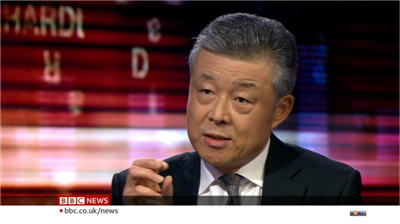
Ambassador: First, I would say Chief Executive Carrie Lam did a good job. Her team and her administration enjoy full support.
Sackur: That is fascinating. For six months she has failed.
Ambassador: No, I wouldn’t say that she had failed. There are many reasons. [She wouldn’t] if there were no foreign forces behind it, if there were no radical, violent rioters who blocked and sabotaged the conversation. You know, Carrie Lam and her team made many efforts to communicate, to reach out to the public. You know, since this happened in the past five months, Carrie Lam and her team have conducted more than 100 events to communicate with the local people, but the radicals do not give them the chance or opportunity.
Sackur: You’re a veteran ambassador. You know how diplomacy works. I mean, she’s got a choice now. She can either make some concessions – that is, establish a truly independent inquiry into the police actions of recent months and make moves towards universal suffrage for the election of the next chief executive – she can either choose to do that or there’s gonna have to be a much more serious crackdown, and that crackdown if I may say so is going to have to come not from the Hong Kong police who clearly are not capable of restoring order, but it’s going to have to come from the Chinese military, 12,000 of whom are currently based in barracks in Hong Kong. Is that something that you could contemplate?
Ambassador: I think Carrie Lam and her team made every effort to address the problem. Firstly, she suspended the extradition bill and then she withdrew it. And she also, you know, made what she called four major actions, including more than 100 engagements with local people. But universal suffrage is not something that will come at just a blink of the eye. You know, you have to go through a legal process. The Central Government is committed to universal suffrage. If it were not for the opposition to veto the political reform plan in 2015, there would have already been universal suffrage by 2017.
Sackur: There isn’t anything like universal suffrage for the key post of Chief Executive. That is ultimately a choice that is based upon nominees selected from Beijing and ultimately voted upon by about 1,000 people. That is very far from universal suffrage. What it seems to me is that in the end, Beijing is scared about what is happening in Hong Kong because you fear that the rest of your population in the rest of your nation is watching very carefully to see what happens to this call for genuine, genuine freedom and democracy in Hong Kong.
Ambassador: I think you missed another big picture. You know, you raised so many topics, so many issues. Let’s go one by one. Firstly, about the universal suffrage, as I said, if it had not been for the veto of the opposition to the political reform programme in 2015, by 2017, two years ago, the chief executive would have been selected by universal suffrage. Yes, it’s not a hundred percent universal suffrage, but it has to go step by step.
Sackur: Ambassador, you are still a diplomat. You can’t dress up.
Ambassador: You know, when we talk about universal suffrage, there are two areas. One is chief executive and the other is legislative council. Right? So if it had not been for the blocking by the opposition, next year, legislative election will be universal suffrage – one man one vote in Hong Kong for 7 million people.
Sackur: It’s not going to be. There isn’t universal suffrage. We’ve just seen the Communist Party in Beijing declared that a decision taken by the High Court in Hong Kong to disregard Carrie Lam’s ban on face mask, according to Beijing, according to your Party, is now null and void. So you are now intruding on the fundamental principle of “One Country, Two Systems”.
Ambassador: No, not at all. I think you gave me no opportunity to answer all your questions. You talked about the fundamental question, about the situation in China. You said that people are concerned about what is going on that might spill over to China. That is not the case. You know, we just celebrated 70th anniversary of the founding of the People’s Republic of China. So you have to realize what the achievement China has made in the past 70 years. People are living better, happier and longer. So within 70 years, we elevated people’s life expectancy from 35 to 77. You tell me which country has this achievement. In the past 40 years since reform and opening up, China’s status in terms of the world ranking rose from the 11th to the second largest economy. And we have elevated 700 million people out of poverty. So people love Communist Party of China, and Communist Party of China is the backbone of the country. So there will be no such thing as you talk about what happened to Hong Kong will spill over or cause some huge demonstration in China.
Sackur: You painted a fascinating picture.
Ambassador: I didn’t paint a fascinating picture. It’s the fact.
Sackur: Let us explore what you just said, because you’re taking it beyond Hong Kong.
Ambassador: You are taking me beyond Hong Kong.
Sackur: Nobody would doubt the incredible economic achievements of the Chinese government over decades. If you are so insistent that the people of your country are so very happy, why is your government apparently so frightened of dissent inside your country?
Ambassador: We’re not frightened of any dissent.
Sackur: How many political prisoners are there in China?
Ambassador: There is no political prisoner in China.
Sackur: Ambassador, that’s not true.
Ambassador: The people will not be put behind the bars just because of their thoughts. The people are put behind the bar because they have violated the law in China.
Sackur: But your laws preclude genuine political opposition.
Ambassador: No.
Sackur: If people are dissenting from the party line, they will very quickly find themselves contravening your laws.
Ambassador: No.
Sackur: Not only that, we have seen in the last two or three years, the creation of a surveillance society in China, where every thought and every move made by your population is surveilled.
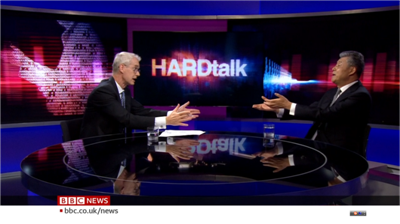
Ambassador: Can I ask you a question? How many surveillance CCTVs are there here in the UK?
Sackur: Not as many as in China.
Ambassador: But in per capita…
Sackur: We are not one of the highest …
Ambassador: So how would you explain this situation?
Sackur: I would explain the situation by pointing out that in China,
Ambassador: But I am asking you about the CCTV in the UK.
Sackur: In China, there will be one CCTV camera for every two people. You have 1.4 billion people. That is an unimaginable surveillance society. What’s it for?
Ambassador: Have you been to China?
Sackur: I have been to China.
Ambassador: When was your last visit to China?
Sackur: It was probably about three years ago.
Ambassador: I think in China, you will feel that people are very free and very happy. You can’t feel it? You feel people are under harassment, people are threatened, and they have a lot of complaints? You can see smiling face on the Chinese people. Yes, people have some complaints. In any society people will have the complaint. But people have their channels to make their complaints known. We have the National People’s Congress and National Committee of the Chinese People’s Political Consultative Conference. You feel China has no street politics, so China has no democracy. But China’s democracy is of Chinese characteristic. You can’t use your standard to judge other country, just like we would not judge you based on our standard.
Sackur: Let’s then talk about Xinjiang, one of the provinces in western China, which sees the greatest repression. Now you will know as well as I do in recent days, we’ve seen a new slew of leaks of official Communist Party documents which show the extent of the repression of the Uyghur Muslim people of Xinjiang. We know that hundreds and thousands of people over the last two years have been interned in camps – camps which looked to the outside eye like prisons. Why?
Ambassador: First let me tell you, there are no such leaked documents. I said in the very clear-cut term during my press conference, this is fake news, this is a made-up story with ulterior motives. There are no such leaked documents. It is made up.
Sackur: Just because you call them fake news doesn’t mean they are fake.
Ambassador: Let talk about the documents. I have double checked with the relevant department authorities. There are no such leaked documents. Secondly, let’s talk about what is happening in Xinjiang. Have you been to Xinjiang yourself?
Sackur: No, I haven’t. I would love to go and if you’re prepared to invite me to travel.
Ambassador: Definitely. We have a saying, if you do not go to Xinjiang, you do not know how vast China is and how beautiful China is. This place used to be very peaceful and very prosperous. But between 1990s and 2016, it was not the scene we’d like to see. It became a battleground. There were thousands of terrorist attacks. Thousands of innocent people got killed or injured. In 2014 alone, there were two terrorist attack cases per three days. People cannot walk safely in the street during those days. So people call for the government to take actions. The government, according to law, set up the vocational education and training centres. The purpose is to de-radicalize some young people especially.
Sackur: These are camps where you know that you have used police batons, electric cattle prods, handcuffs, pepper sprays inside these camps. We know because we’ve seen the procurement orders for all of these things which have been leaked.
Ambassador: This is not true.
Sackur: Well, it is. You can keep telling me these leaks aren’t true, but it is clear these are genuine documents. The United States government, amongst many others, has said that. This is the quote from Michael Pence, the Vice President, the Communist Party has imprisoned as many as a million Muslim Uyghurs in camps where, his words, “they endure around the clock brainwashing”.
Ambassador: I do not believe in Michael Pence. He’s a China basher. You call him Vice President, but I think he’s a Cold War warrior against China. His words do not stand with me. So we don’t talk about Michael Pence. We talk about what is going on in Xinjiang.
Sackur: You do have your views about Michael Pence. He happens to be the Vice President of the United States.
Ambassador: We show respect when he is Vice President, but I can’t agree with him when he is demonizing China.
Sackur: But you have a problem here, Ambassador. We talked about Hong Kong. We talked about what you’re doing to the Uyghurs in the west of your country. The United States Congress has just passed a new round of targeted sanctions against officials in Hong Kong who are leading the crackdown against the protesters. Your diplomatic position, and you know it well yourself because you’ve just been hauled over the calls by Dominic Raab, the Foreign Secretary in London, you know that your diplomatic position as the Chinese government defends what is happening is coming under enormous pressure.
Ambassador: I don’t think so. I think the Western countries are under enormous pressure for interfering in China’s internal affairs. Let me say this. What if China’s National People’s Congress passed a law concerning a region in the United Kingdom to express our concern and to impose sanction on your politicians if you do not follow the law, what do you think about? It’s totally against international norm that’s governing the international relations. We are in the 21st Century. We are not in the age of the gunboat diplomacy. China is not a country you can kick around.
Sackur: Do you really think that governments in the West in particular are trying to kick you around? You are a long-serving Ambassador. Not so long ago, you and the British government were talking about the “Golden Era” in relations. Now, you’ve just come back from the foreign office with the Foreign Secretary describing himself as shocked and appalled by the arrest of a former employee in the UK consulate in Hong Kong who was tortured in China. The British government is furious about it. They’re just criticizing and condemning your actions in Hong Kong, and in Xinjiang as well. The United States is now saying, and I’m quoting the head of the FBI, “China’s goal, it seems, is to replace the US as the world’s leading superpower, and they’re prepared to break the law to get there. This “Golden Era” has collapsed into recrimination and rivalry.
Ambassador: So it’s my turn to talk.
Sackur: It is.
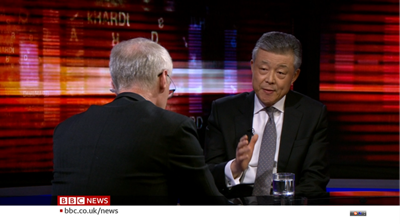
Ambassador: I hope you will not interrupt me. I know your HARDtalk is about hard subjects. It is not about you talking all the time. First, about Raab’s meeting with me. Yes, he did raise this case of Simon Cheng. He didn’t mention Xinjiang. To tell you, it is me who expressed our strong opposition to UK interference into China’s internal affair, that is, Hong Kong. With regard to Simon Cheng, you know, he violated the law in China for soliciting prostitution. And he confessed all his wrongdoings.
Sackur: I’m sure he did after the usual Chinese torture tactics.
Ambassador: Would you give me some time to explain before you can interrupt me? You know, you covered so many subjects. I need to come back to you one by one. His so-called charges against China’s police are totally rejected. We already made our response to the Foreign Office. We cannot accept the so-called torture. There’s no torture at all. When he was arrested and when he was released, he had physical examination. His condition is perfect. No problem at all.
Sackur: Ambassador, you have made your points. The bigger point I want to make is…
Ambassador: So that shows you had such a bias against China.
Sackur: Forgive me. We are out of time, so I just want to go to this big point. The US and the UK appear convinced now that, as I just quoted a senior US official, “China’s goal is to replace the US as the world’s leading superpower. Is that ultimately the strategy in Beijing?
Ambassador: No, not at all. We’re not interested in replacing anyone or challenging anyone. You know, we are still a developing country though we are the second largest economy. In per capita income, we are way behind. You know, we’re just less than 10 thousand US dollars. This is my third ambassadorship. After my ambassadorship in Egypt, I was seconded to Gansu, one of the poorest provinces in the Wild West. People there did not even have access to drinkable water, you know. They had to build cellars to catch rainwater and then to purify it. Both human being and live stock have to depend on this purified rain water. So it’s an enormous challenge for the Chinese government, for the Chinese leaders, how to feed the Chinese population, how to make the Chinese people even happier, living longer. China follows the foreign policy of peaceful development.
Sackur: But you know, Deng Xiaoping famously said China’s strategy was to hide the strength, bide your time, never take the lead. That clearly is not the strategy of Xi Jinping.
Ambassador: Peaceful development is still our strategy, because we benefit from it. People talk about 40 years of miracle in China. We can achieve this because we are in a peaceful environment. We can only have more success by having, and continuing to build, a peaceful environment. So that’s why President Xi Jinping calls for building a shared future for mankind. That is our goal, and continues to be our goal.
Sackur: Ambassador Liu Xiaoming, thank you very much for being on HARDtalk.
Ambassador: Thank you.
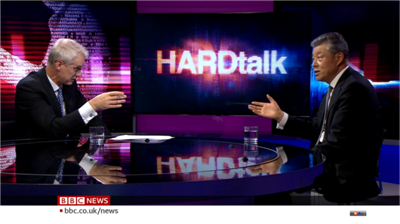
|

